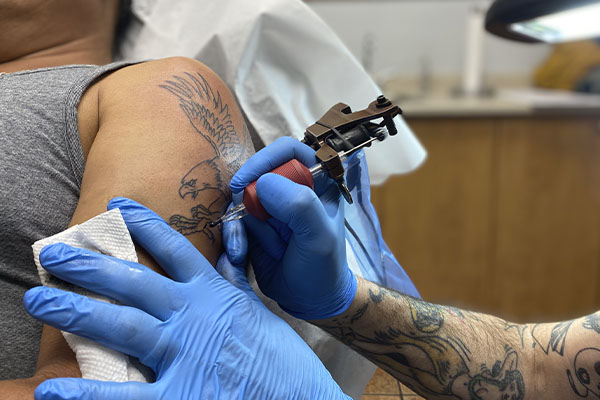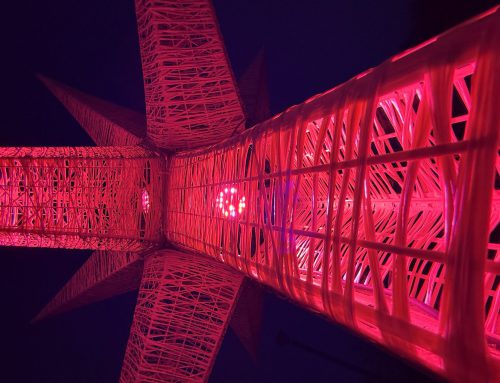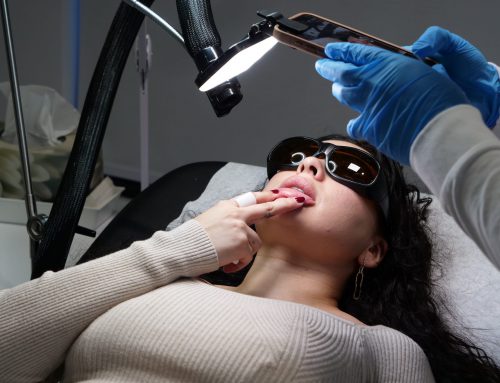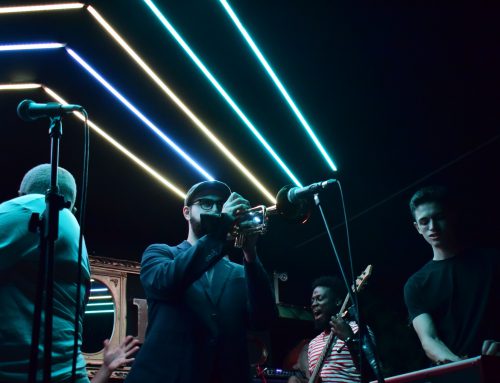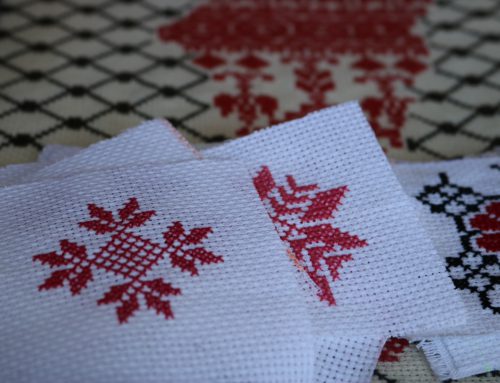BY Katherina Boucher & Youmna El Halabi
There are white and teal wooden walls covered with colourful drawings of flowery ladies and cartoon alligators. Plants adorn the countertops, with one of them actually climbing a pipe towards the ceiling. Cushions are decorated with flowers and leaves, as well as unicorns in the bathroom.
It may sound like a tiki bar, but it isn’t. It is Equinoxe Tattoo.
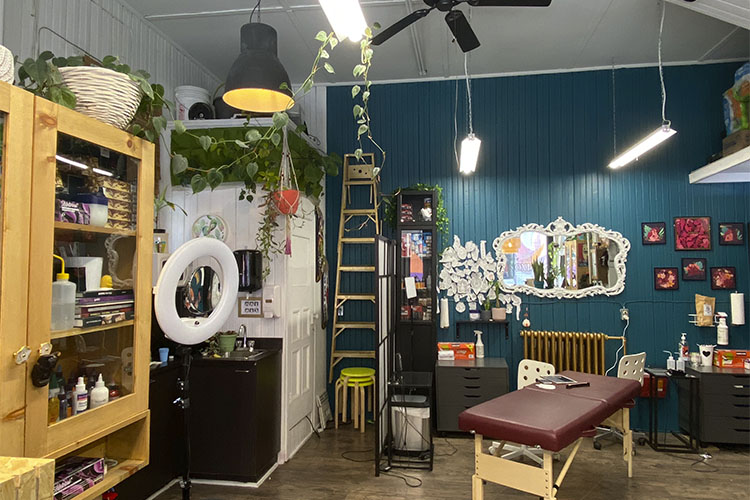
The inside of Studio Equinoxe Tattoo shop, on Plateau Mont- Royal, Montreal. Photo by Youmna El Halabi.
Equinoxe co-owner and tattoo artist Genevieve Farley-Tremblay, says that they wanted to build a shop where “a mother and her daughter could come in and get tattoos at and not feel threatened.
“We wanted something less cliché,” says Farley-Tremblay. “Maybe a tiny bit more like Pinterest.”
Equinoxe opened a year and a half ago in the Plateau Mont-Royal. They bill themselves as a safe, inclusive space for the LGBTQ+ community, and they also offer a “vegan process” when it comes to the treatment of new tattoos.
“Being inclusive for us is just normal,” says Farley-Tremblay. “We write it because now it’s important to mention it, but for us it’s just common sense.”
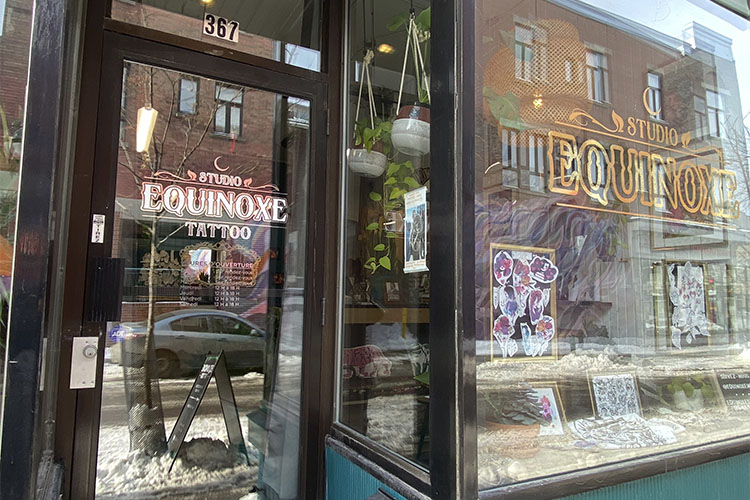
A look of Studio Equinoxe Tattoo on the outside. Photo by Youmna El Halabi.
Farley-Tremblay describes Equinoxe as a kind of co-op. It’s owned by three tattoo artists: Val Day, David Messervier and Farley-Tremblay. They share the space, rather than having a boss that owns a shop but doesn’t really do tattoos themselves.
Equinoxe is not the norm when it comes to tattoo shops in Montreal, but it is representative of a maturing industry.
Montreal is very competitive and diverse when it comes to tattooing according to tattoo artist Aimée Boucher, also known by her clients as Morning Gory.
As her artist name suggests, her style mixes flowery patterns with a gory aesthetic. Boucher is now with DFA Tattoos and was voted second best tattoo artist in Montreal by CultMTL in 2019.
According to Boucher, the past five years have seen an increase in the opening of boutique tattoo shops in Montreal. These shops will have tattoo artists promote their own specific styles, rather than marketing themselves as just a tattoo shop.
“It’s no longer ‘Oh, I want to get a tattoo’,” says Boucher. “It’s ‘Oh, I want to get a black work tattoo by someone who is queer friendly in a safe space’ or ‘I want a traditional tattoo that’s done by a guy that’s been tattooing for 30 years that like, doesn’t use gloves.’ It’s grown so much.”
Tony D’Annessa, a tattoo artist and owner of Pointe St-Charles Tattoo, as well as self-proclaimed oldest tattoo artist in Canada, says that back when he opened his shop in 1976, most customers were walk-ins. Now he says things have changed.
“They come in here wanting huge tattoos, body work tattoos,” says D’Annessa. “They don’t come in here and pick anything off the wall anymore. Now they want a custom experience, like a custom tattoo.”
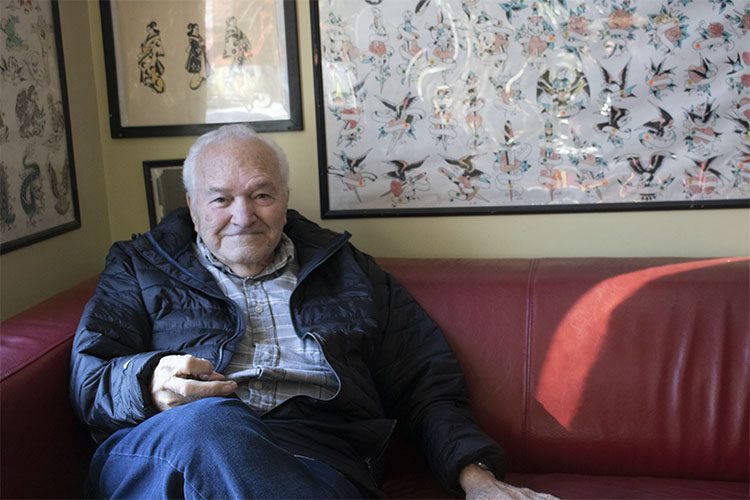
Tony D’Annessa, tattoo artist and owner of Pointe St-Charles Tattoo. Photo by Youmna El Halabi.
Ralkinz, a tattoo artist and owner of XYZ tattoos says, “Sometimes we will do flash pieces like I do, but now the flash pieces they usually go on one person and they won’t be redone on another person, so it’s like a one-time tattoo.”
According to D’Annessa, the decline of walk-ins started when too many people got into the business. “There’s a shop opening every other week,” says D’Annessa. “And they not only have stores. They do it in their apartments and everything else. That’s how tattooing goes today.”
For Equinoxe, walk-ins represent about 25 per cent of their business. While they wanted a studio with street visibility to have some walk-ins, Farley-Tremblay says that they could not rely on walk-ins to pay their rent.
Only about 10 per cent of Boucher’s clientele are walk-ins. For, Ralkinz it’s 0 per cent.
Younger artists all have one word to explain this shift: Instagram.
Boucher says that all of her bookings come from Instagram. “I have an email, I’m on a website,” says Boucher, “Haven’t got anything from them in months. “It’s just Instagram.”
This is echoed by David Messervier, tattoo artist and Equinoxe co-owner.
“Pretty much every one of my customers talk to me via Instagram,” he says, “The phone never rings.”
Ralkinz is a good example of this shift. Her studio is in a small apartment near the Joliette metro station. Her studio has no street visibility, and works by appointment only. Appointments she makes through Instagram.
Boucher explains that Instagram makes tattoos more accessible to everybody. “You’re home, you’re at work, you’re scrolling photography of food, restaurants, fashion, now there’s tattoos that are mixed in,” says Boucher. “As easily as you can look for where to go for dinner, tattoos pop up and you can shop.”
Boucher says that Instagram has also helped dismantle the stereotype that tattoos have to be aggressive. “Because it is easy to follow an artist and kind of see their personality,” says Boucher., “It’s making tattoo artists more approachable and it’s just making it easier for people to commit.”
This has also helped tattoo artists connect on a more personal level with their clientele.
“There is a face to it now,” says Boucher. “When you’re relatable and people see you, they’re more inclined to come to you and give you their business because there is a person behind it.
They’re not walking into a scary tattoo shop where they don’t know anything and they don’t know anybody, they don’t know if you’re approachable. So they see me I’m like a weirdo that likes horror movies and cats and a lot of people identify with that and they’re like ‘oh, I like this weird chick with the purple hair, but who’s like super into horror movies and cats and I love cats. I’m gonna go see her’. So that’s something I shifted on my social media that has helped me grow my business. The fact that people can see that I am friendly, that’s why I think I am doing well.”
Instagram also works as an online portfolio that has an unlimited reach. Messeriver says that a successful tattoo artist is one that is unique.
“It’s a good thing because I have some customers that came from like New York that came here in Montreal just to get a tattoo by me.”
This accessibility provided by social media is also reflected in older people who might have never thought they would have gotten a tattoo back a few years back.
When Aimée got her first tattoo at age 14, her mother, Anne Boucher, was less than pleased.
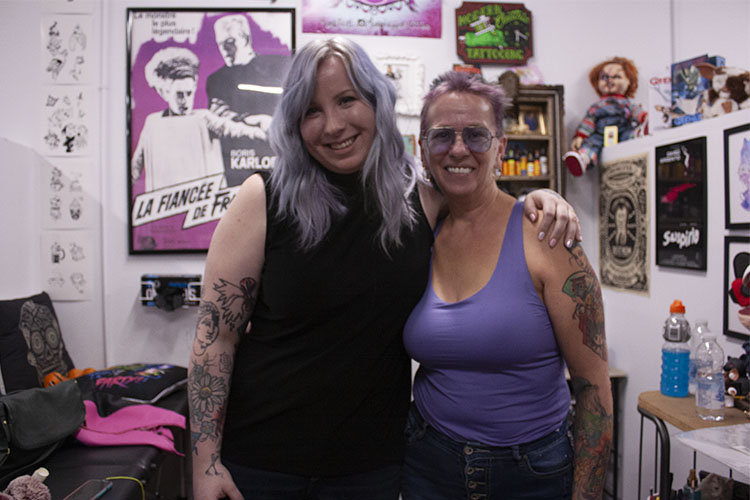
Aimee Boucher, also known as Morning Gory, poses with her mom Anne Boucher, at DFA Tattoo, on Ste. Catherine St., Montreal. Photo by Youmna El Halabi.
“My mother was like ‘you’ll never gonna get a job’,” says Aimée. “No one’s ever gonna respect you again’ like ‘what are doing?’, ‘you’ve ruined your life’.”
Anne now has her arms covered in tattoos ranging from a Geisha with a Pikachu on her kimono, to Stitch from “Lilo and Stitch”. Anne was warmed to the idea of tattoos by her daughter after 10 years, but also because of social media. “When you’re looking on Pinterest,” Anne says, “things pop up and it’s like ‘oh, this is cute, you know’.”
When Tony D’Annessa opened his shop in 1976, he was working another job and he was only open at night. He says that for the first year, tattooing was “not worth it” when it came to earning money.
Things have definitely changed.
Aimée didn’t think that she would be able to make a living from her tattoos. But since tattoos in Montreal have become so popular, it is now her career.
“I kept one foot in the door for my accounting job,” Boucher says. “I went from five days a week, to four days a week, to three days a week to just doing it for tax season, and then I stopped it, after I started tattooing full time, because I was actually busy.”
